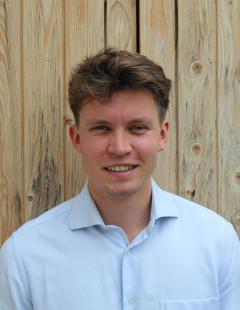Simon Ahrens
Tell us about your background
Originally from Germany, I received my BA in International Relations from King’s College, London. I then started pursuing a graduate certificate in Philosophy and Ethics at Harvard University. Before coming to ODID, I first gained work experiences in the field of development cooperation and diplomacy as an intern at the Colombian NGO Escuelas de Paz and the German Parliament.

“Do not let the university’s prestige or its reputation for traditional attitudes keep you from applying. While Oxford certainly changes your thinking as a student, the students in turn constantly change Oxford as well.”
“Do not let the university’s prestige or its reputation for traditional attitudes keep you from applying. While Oxford certainly changes your thinking as a student, the students in turn constantly change Oxford as well.”
What made you choose to study at ODID?
I chose to study at ODID because it offered a critical approach to development as an interdisciplinary and multidisciplinary field of study. Above all, the department trains students to undertake original research at a Master’s level. The two-year MPhil in Development Studies provided me with an opportunity to conduct fieldwork for my thesis. Interactive classes in preparation for fieldwork covered a broad range of topics - from research design and ethics to qualitative and quantitative research methods. The MPhil thus appeared to be an ideal stepping stone both for a career in development policy and a doctorate in international development or related disciplines.
What do you particularly like about ODID?
What I immediately liked about the department was its truly global and multidisciplinary outlook. The personal backgrounds and research interests of faculty and students perfectly reflect this: on a typical day, you may have a lecture on the anthropological study of money in the morning, discuss postcolonial theories of development with friends over lunch, and attend a panel discussion on North Africa’s renewable energy transitions in the afternoon. Most classes at ODID have between 5 and 25 students. The lively exchange of ideas in these small group settings not only enhanced the quality of learning, but also helped forge close friendships within our cohort. Moreover, ODID’s wonderful staff played a key role in creating a welcoming environment for all students from the very first day. (A special shoutout to Gary – the department’s legendary caretaker!).
What do you particularly like about your course of study?
On top of learning from my fellow students, my favourite part of the course was the one-on-one exchange with professors, particularly with my thesis supervisor, Jocelyn Alexander. Amid the challenges of adapting to the MPhil curriculum and life in Oxford, her supervision offered invaluable support in academic and personal matters. Overall, the course has made me more curious, nuanced and critical in my thinking about development. It combined insights into the latest research findings with a rigorous introduction to the discipline’s colonial history and its contemporary legacies. In the first year, foundation classes in economics and anthropology provided me with a firm grounding in two of the social sciences relevant to the study of development. Having had no prior training in the field, I also found the class on core debates in development theory and practice very helpful. In the second year, the course structure allowed me to tailor the degree to my preferences and attend classes outside the department. To explore a new regional focus beyond my thesis research on Botswana, I took a fascinating class by Francesca Lessa on the International Relations of Latin America.
What other activities have you been involved with at Oxford?
Over the course of the MPhil, I took part in some of the countless social and academic events at Oxford. These ranged from classical music concerts and book launches to college barbeques and forest raves. Keen to try out a new sport, I joined the salsa dancing society of my college, which turned out to be a great space for making new friends from other courses. I also really enjoyed working with the team at OGASS, Oxford’s application support scheme for prospective graduate students who have been affected by forced displacement.
Is life at Oxford different from how you expected it to be?
Where do I even start? Before coming to Oxford, I had heard about the intense eight-week terms, the historic libraries, and the imposing college buildings. These expectations proved to be well-founded. What I did not expect, however, was the strong sense of community among students inside and outside the classroom. We quickly bonded over our shared imposter syndrome and tried to create an inclusive atmosphere of mutual learning in our seminars. In the afternoons, we explored local pubs, markets, and the beauty of the British countryside. Somewhere between the long swims in Port Meadow, the garden potlucks and the study sessions with friends, Oxford became a home away from home.
What advice would you give to someone thinking of applying?
At ODID, you will meet students and academics who deeply care about their research and are passionate about learning from each other. The MPhil provides the tools for you to engage with, question and challenge development discourse and policy intervention. To get a sense of the programme before you apply, have a look at the research interests of the department's professors and the current classes on offer. If you think they would be a good fit for you, give it a go. Do not let the university’s prestige or its reputation for traditional attitudes keep you from applying. While Oxford certainly changes your thinking as a student, the students in turn constantly change Oxford as well. Your course mates at ODID will welcome your contributions with open arms. Good luck with your application, and see you soon!
